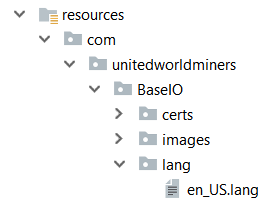Localization
It is highly recommended that you use this feature as it also allows server admins to customize your strings.
Localization is a feature of MessageUtils.
Setup
To start working with BaseIO's localization feature just call MessageUtils.setupTranslations(langResourcePath). For the most basic setup use null as parameter and you're done. Now server admins can add translations for your strings as they wish.
If you want to add your own translations to your mod fill langResourcePath with a string path pointing to a folder in your mod resources.
For example BaseIO has MessageUtils.setupTranslations("com/unitedworldminers/BaseIO/lang").
It is recommended to call this method in your init method (FMLInitializationEvent).
Creating localization mappings
The default language file is en_US.lang. This file will be used if you aren't providing the correct language.
You can use almost any string as a key, but it's recommended to abstract them.
The mapping files itself are the same as the ones from Minecraft: <key>=<mapping>, an example file can be found on the right sidebar. This files have to be named by the language tag given by Minecraft and must have the extension .lang.
In the mappings you can use arguments following the same format of the java formatter (String.format). These arguments can be injected in the method calls using localizations.
If you are a modder you put the files in your resource folder that you pointed at in setupTranslations.
If you are a server admin you can put the files into config/lang/<modid>/.
You can reload the mappings with /baseio reloadMessages <modid>.
Using localizations
Your localizations can be used in
MessageUtils.messageToSender()- Simplecommand's
commandUsage() - Manually:
MessageUtils.getTranslation()


No comments to display
No comments to display